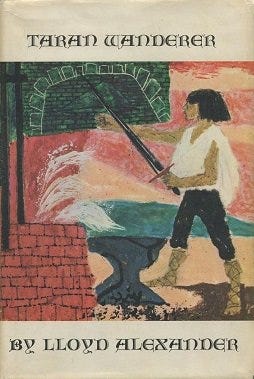On the Podcast: Distraction and Mastery
What would it mean–for us, our families, and our vocations–if we could learn to be fully present?
Once upon a time, in the land of Prydain, a young man set out to discover his true calling. After many weeks of journeying, Taran of Caer Dallben found himself at the forge of Hevydd the Smith.
Hevydd was perhaps the greatest smith in all Prydain, renowned far and wide for his skill and craftsmanship. He was a barrel-chested, leather-aproned man with scorched eyelashes, a sooty face, and burly shoulders so used to the feel of sparks that he might have been almost part of his forge.
Taran was eager to learn the noble art of swordmaking, and the master smith was willing enough to teach him. Taran expected to be handed hammer and tongs and put to work shaping one of the bars of steel at the forge. But Hevydd had no such intention.
“What, start when the work is half done?” he snorted. “No no, my lad, you’ll forge a sword from beginning to end.”
And so Taran found himself gathering fuel for the furnace, all day long feeding a roaring, flame-tongued monster that could never eat its fill. Then came shoveling a mountain of stones, smelting the metal they contained. By the time Taran was allowed to touch a blade, his hands were covered with more blisters than skin, his back ached, and his ears rang with the constant clatter.
Eventually, he left with a strong but plain sword in his scabbard, to continue his quest.
Soon after, he found shelter from a rainstorm in the home of an old woman whose long hair was as white as the wool hanging from her belt. A web of wrinkles covered her face, but for all her years she gave no signs of frailty, for time had seasoned her, and her gray eyes were sharp and bright as a pair of new needles.
“I am Dwyvach Weaver-Woman,” she said. “And I can see you’ve need of a new cloak.”
And so Taran found himself at her loom, hoping weaving might prove easier than smithing.
Again, he expected to sit at the great loom, to watch the shuttle dance between the threads. Instead, Dwyvach led him to a chamber bursting with raw wool. "Tease out the thorns, pick out the cockleburs," she commands. "Comb it, card it—carefully, Wanderer, or when your cloak is done you'll feel it's made of thistles instead of wool!"
Days of painstaking work followed—cleaning, spinning, dyeing—until Taran's eyes were bleary and his fingers raw. Only when he knew the feel of wool at every step like the back of his hand, was he allowed to approach the loom. "All things are done step by step and strand by strand," Dwyvach told him.
In the end, Taran left the weaver’s cottage with a serviceable new cloak, but his longing had not found a rest at the loom.
A few days later, Taran came upon an old man standing beside a pair of wooden buckets on a yoke at the edge of a shallow stream. Taran offered to carry his buckets and soon found himself gasping under their weight. Grinning, the man took the buckets back and briskly carried them back to a shed where he poured the mud into a great wooden vat.
In the next room, Taran saw shelves holding jars and bowls of all kinds whose craftsmanship made him catch his breath. “If this is your work,” he said, “I know you–you are Annlaw Clay-Shaper, master potter of the Free Commots.”
The man nodded. “If you’ve seen my work, it may be that you indeed know me, for I am old at my craft, and no longer sure where the clay ends and Annlaw begins.”
Annlaw agreed to teach Taran some of what he knew. And day after day, he sent him to dig clay from the streambank, to learn its weight and texture, to sift and mix and temper it until it almost became a part of him. "Before you learn the craft," Annlaw explains, "you must first learn the clay."
In our age of endless productivity and constant motion, we've forgotten what these ancient craftsmen knew. And so we mistake busyness for purpose, distraction for engagement, and motion for life.
But what if the masters were right? What if the path to true mastery—whether of craft or calling or simply being human—begins not with doing more, but with learning to be still? What if our souls, like Taran's hands, need to be trained in being present before they can create anything worth keeping?
Resources Mentioned in this Episode
Taran Wanderer by Lloyd Alexander, the Chronicles of Prydain series
Leisure, the Basis of Culture by Josef Pieper
“No Shortcut to the Heart” by Matthew Clark
The Inner Ring, by C. S. Lewis
Jesus of Nazareth trilogy by Pope Benedict XVI
Reclaiming Quiet by Sarah Clarkson
The Spirit of the Disciplines by Dallas Willard
“Praying” by Mary Oliver
Recommended Reading and Listening
The Poetry of Presence, the Anselm Society’s curated offerings for July
We are now publishing poetry! Read the original offerings for summer and ordinary time here.
“Making the Most of our Time”: an archival Imagination Redeemed podcast with the dear, dear Leslie Bustard
“Endless Summer” by Gray Havens
A Tale of Two Trees by Matthew Clark
Discussion Questions
You may listen to podcast episodes while commuting, exercising, or doing chores. We certainly hope that Imagination Redeemed is part your everyday life!
But IF you got the wild idea to, say, host a listening party—or listen separately and come together with friends to discuss the episode over craft or coffee … well, we’d want you to have discussion questions for the occasion!
(While we’re on the subject, should book listening clubs become a bigger thing? We vote yes.)
What are the implications if the path to true mastery, whether of craft or calling or simply being human, begins not with doing more, but with learning to be still and present?
Where do you notice a task-driven approach in your own life—ways that you have bought into believing that your humanity is a tool, much like a computer?
How does our capacity to be quiet shape us?
Have you ever tried an exercise like choosing not to touch your phone for an hour or just sitting outside to soak in the quiet? Stay tuned for our bonus episode with none other than Malcolm Guite, where we’ll explore the concept of stillness even further!
For the Senses
Brian’s recommendation for back porch sipping this summer, which will be featured in our upcoming “What We’re Loving This Summer” edition.
In Closing
The Imagination Redeemed podcast is a production of The Anselm Society. It’s easy to see this world as disenchanted, and to give up hope that there’s more. But you were made to see the world with the eyes of heaven. And to live a bountiful life that participates in the life of God…like in the great stories. To help make this show possible, go to anselmsociety.org/podcast25 and make a donation.
The Anselm Society is a place where you can come in and experience that beauty, joyful celebration, and ancient wisdom. And go out renewed, bringing that life to your vocation, home, & church. Learn more at anselmsociety.org, and join us next time as we pursue a renaissance of the Christian imagination together.









